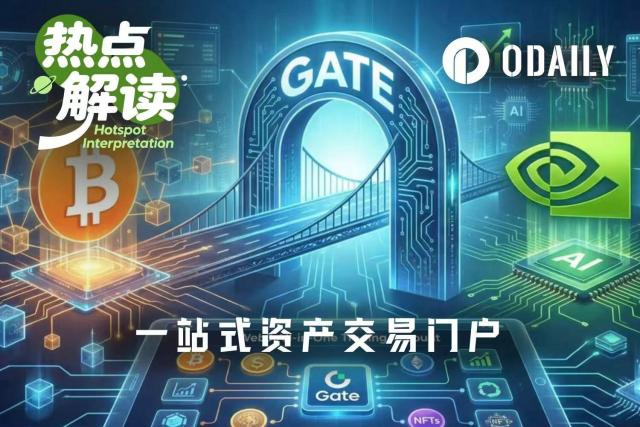A comprehensive breakdown of the top decentralized finance (DeFi) protocols to watch in 2024.
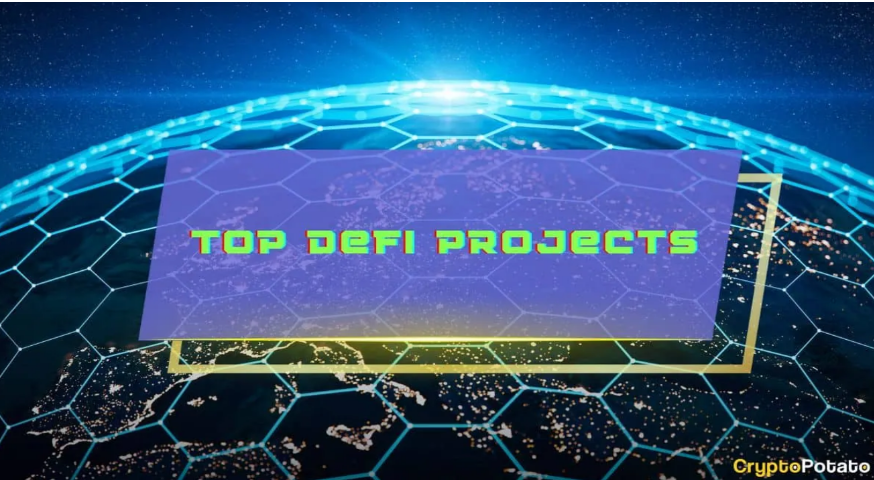
Decentralized finance (DeFi) is a financial ecosystem consisting of decentralized applications (dApps) built on blockchain networks, with Ethereum being the most popular.
It is difficult to pinpoint the exact time when DeFi was born, as there is no universally recognized date that marks the birth of the DeFi field. It can be said that DeFi has gradually taken shape as different components of the blockchain technology stack and key developments in the crypto industry have worked together to solve specific problems or innovate on existing features/services.
DeFi runs on a decentralized network, mainly blockchain technology, which means that no single entity can control the entire system. This is different from traditional finance, where centralized institutions oversee and manage financial transactions. DeFi relies on smart contracts - digital contracts that are automatically executed when certain conditions are met without the need for intermediaries.
In addition, in DeFi, decentralized autonomous organizations (DAOs) are responsible for the development and sustainability of DeFi projects. Each DAO can implement a governance structure according to its own rules and procedures, including voting mechanisms, vesting schedules, token delegation, protocol development, etc.
Here’s an in-depth guide to the best DeFi projects that exist not only on Ethereum but also on other popular chains like Solana, TRON, Base, and more.
The 14 DeFi projects worth paying attention to in 2024 are:
1) Uniswap: Ethereum’s top decentralized trading platform
2) Aave: The largest lending platform on Ethereum
3) Lido: Ethereum’s leading staking protocol
4) EigenLayer: Ethereum’s top re-staking protocol
5) Ondo Finance: The largest RWA protocol
6) PancakeSwap: Top decentralized trading platform on BNB chain
7) Jito: Top dApp on Solana Blockchain
8) MakerDAO: Creator of the largest decentralized stablecoin (DAI)
9) Raydium: Leading Decentralized Exchange on Solana
10) 1inch: Ethereum’s veteran decentralized trading platform
11) Aerodrome: Top Lending Protocol on Base
12) Just Lend: The largest lending protocol on TRON
14) Honorable mention projects: Indigo Protocol, Benqi
The following projects have been handpicked based on their popularity and influence in the DeFi market. Without further ado, let’s take a look at some of the best DeFi projects of 2024.
1. 14 DeFi projects worth watching in 2024
1) Uniswap: Ethereum’s top decentralized trading platform
Brief Overview:
- Leading decentralized trading platform
- Created and promoted the automated market maker (AMM) model
- Well-supported agreement with nearly $180 million in funding
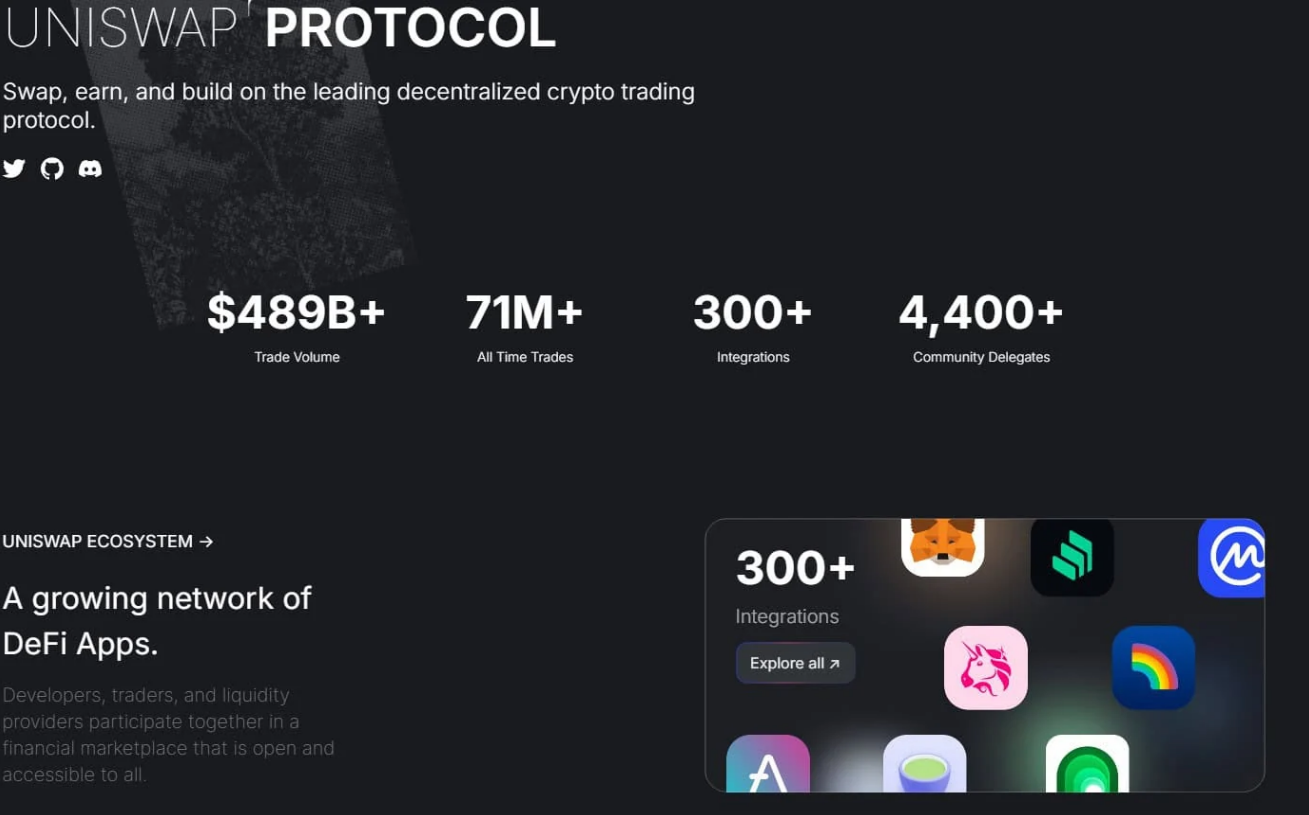
Uniswap (UNI) is one of the best DeFi projects in the industry. This decentralized trading platform has accumulated billions of dollars in total locked value. It allows users to exchange tokens and earn income.
Uniswap is completely open source and provides developers with a wealth of resources and tools to build projects on its ecosystem, including getting started guides, protocol documentation, JavaScript SDK, etc. Not only that, Uniswap also provides funding for projects with great potential.
The decentralized exchange is already a household name in the DeFi industry. It popularized the use of automated market makers (AMMs) to source liquidity through liquidity pools, as opposed to traditional order books that rely on market makers to place buy and sell orders.
Uniswap introduced the constant product formula, which is the basis of its AMM model. In short, the formula states that no matter whether the value of two or more tokens in the pool rises or falls, the basic liquidity in the pool needs to remain unchanged.
Founder
Uniswap was originally named Unipeg and was founded by Hayden Adams. After being laid off from Siemens in July 2017, Adams spent several months learning Ethereum in depth, including its programming languages Solidity and JavaScript. In November 2018, Uniswap was officially launched and has achieved remarkable success in the market.
The protocol is now in its third version, Uniswap V3, which brings advantages such as centralized liquidity, better risk management features for liquidity providers (LPs), and reduced slippage for arbitrage traders.
Investors and Supporters
Uniswap has received $176 million in funding from 17 investors, including well-known institutions such as Andreessen Horowitz (a16z), Polychain, Paradigm and Union Square Ventures.
2) Aave: The largest lending platform on Ethereum
Brief Overview:
- The most popular stablecoin staking and lending platform
- It has an over-collateralized stablecoin called GHO, which is backed by Aave assets
- Promoted the use of flash loan in DeFi
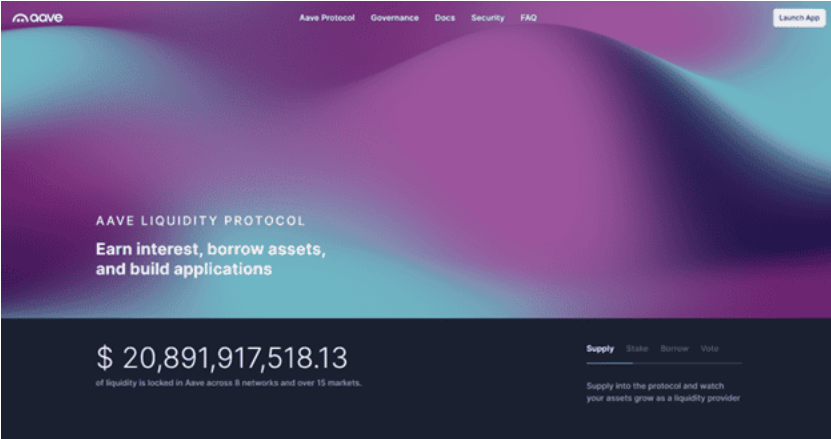
Aave (AAVE) is one of the most popular cryptocurrency lending platforms in the DeFi industry. In 2021, it was the largest DeFi application with a total locked value of more than $18 billion. As of July 2024, Aave remains strong with a total locked value of $13 billion, an increase of 255% from its historical low of $364 million.
Aave, formerly known as ETHLend, was originally built on Ethereum and supports multiple chains such as Polygon, BSC, Arbitrum, Avalanche, Harmony, and Fantom. This enables users to borrow cryptocurrencies across multiple ecosystems without the need for intermediaries.
On Aave, you can also perform other operations such as staking cryptocurrencies and stablecoins such as USDC, or providing liquidity to the protocol's liquidity pools (LPs). In addition, you can also become a member of the governance community and participate in voting or submit proposals called Aave Improvement Requests (AIPs).
Founder
Aave was founded in 2017 by Finnish entrepreneur and programmer Stani Kulechov. He has a law degree from the University of Helsinki, but he started programming at the age of 12 and later became interested in blockchain technology.
Investors and Supporters
Aave has raised nearly $50 million through four investment rounds. Notably, Fantom Foundation is one of its largest investors, having invested $10 million in the protocol in May 2024.
3) Lido: Ethereum’s leading staking protocol
Brief Overview:
- The largest dApp in Ethereum and the entire DeFi market
- The total value of locked funds exceeded 30 billion US dollars, setting one of the highest records in DeFi history
- Created the concept of liquidity pledge
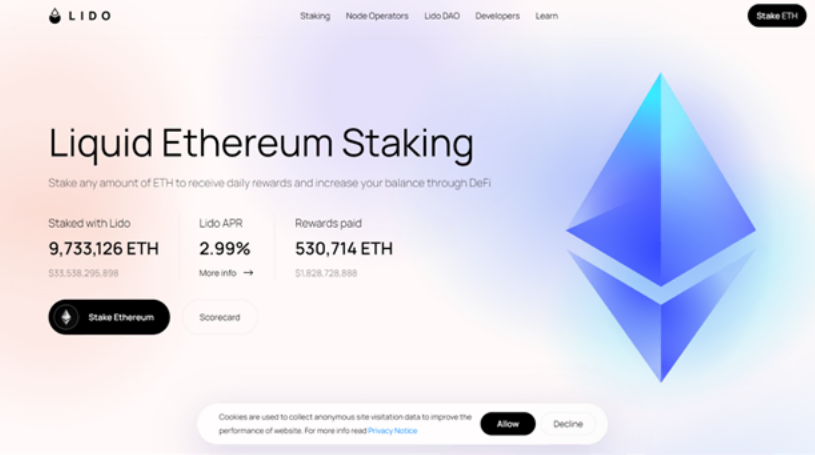
Lido (LDO) is the largest decentralized finance (DeFi) protocol, with a total locked value of over $30 billion.
Lido pioneered the concept of liquidity staking in Ethereum and the wider crypto market, becoming a near-overnight success.
The protocol allows users to stake Ethereum and exchange it for the liquid TokenstETH (Staked Ethereum). stETH can be used in other DeFi applications to earn additional returns while continuing to receive staking rewards and provide security for the Ethereum Beacon Chain.
It’s worth mentioning that Lido has invested more than $4 million in security measures, including audits and bug bounties.
4) EigenLayer: Ethereum’s top re-staking protocol
Brief Overview:
- A heavyweight protocol based on Ethereum that has dominated the market with its re-staking function
- By introducing re-staking, the rules of the game for liquidity staking have been changed, allowing users to further maximize their returns
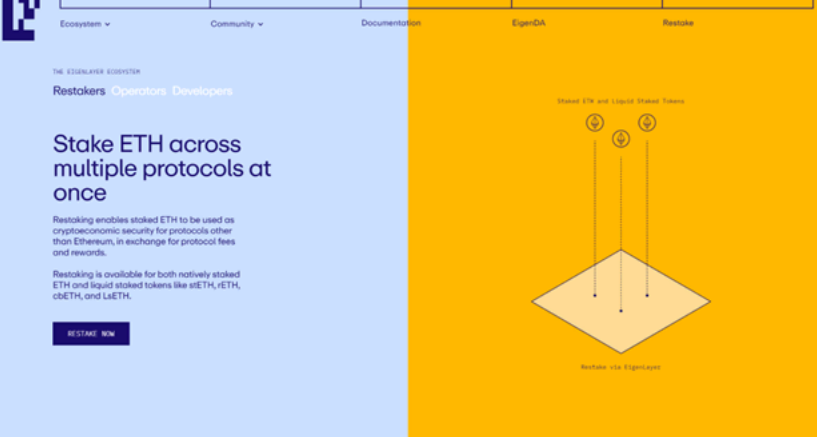
EigenLayer is one of the best DeFi projects on the Ethereum blockchain. It introduces the concept of re-staking, which is to deposit staked Ethereum (stETH) or Liquid Staking Tokens (LSTs) into the protocol's liquidity pool.
Re-staking enhances the security of the liquidity pool by reusing the staked ETH, effectively allowing these staked tokens to be lent to other protocols. This process is achieved through EigenLayer's voluntary mechanism, and users need to agree to two main terms: 1) grant EigenLayer access to the withdrawal voucher of the staked ETH; 2) accept the slashing conditions set by the validator. This setting encourages participation and, most importantly, promotes honest behavior.
EigenLayer acts as an intermediary, creating a free and open market that allows validators and protocols to exchange the security of liquidity pools at a price. Protocols can choose to purchase staked tokens or stETH, thereby controlling the supply, allowing them to purchase additional network security without having to start or invest in validator services.
Validators can evaluate and choose protocols that they believe are safe and profitable to stake (they can also adjust the number of tokens provided to these protocols to ensure security). Overall, EigenLayer's process is neither automated nor random, but carefully managed.
Founder
EigenLayer was founded in early 2021 by Sreeram Kannan, a distinguished expert in engineering, computer science, and telecommunications. His academic background includes study at Guindy College of Engineering, Indian Institute of Science (IISc), and University of Illinois at Urbana-Champaign.
Kannan also worked as a postdoctoral researcher at the University of California, Berkeley, and subsequently became an associate professor at the University of Washington, where he led the UW Blockchain Lab.
Investors and Supporters
According to Crunchbase, EigenLayer has received over $164 million in funding. Their latest funding round was a Series B round that closed on February 22, 2024. Some of the protocol’s major investors include Blockchain Capital, a16z, WAGMI Ventures, and Ambush Capital.
5) Lido: Ethereum’s leading staking protocol
Brief Overview:
- The largest large-scale application (dApp) in Ethereum and the broader DeFi market.
- It once reached a total value locked (TVL) of over $30 billion, one of the highest in DeFi history.
- Created the concept of liquidity pledge.
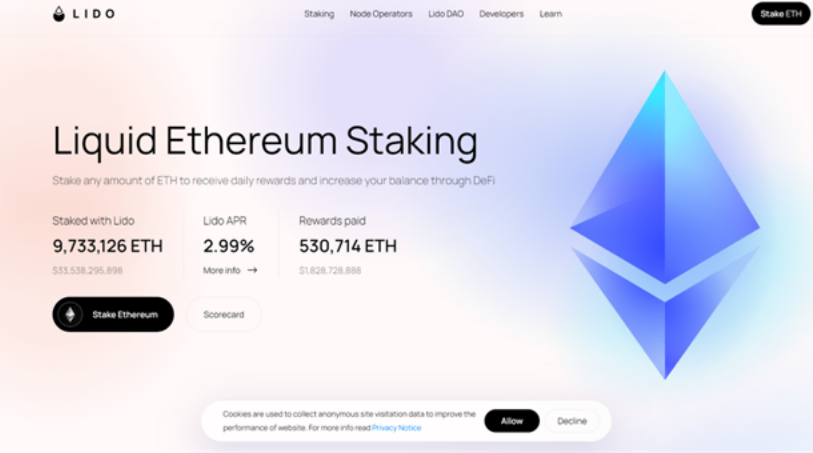
Founder
Lido was founded in 2020 by three well-known crypto and tech entrepreneurs:
- Konstantin Lomashuk: An experienced entrepreneur and blockchain expert, he is also the co-founder of P2P Validator, a well-known staking service provider. He has been actively involved in the crypto space since 2012.
- Vasiliy Shapovalov: A blockchain developer and researcher with extensive experience in smart contract development and blockchain architecture. Prior to founding Lido, Shapovalov participated in multiple blockchain projects and contributed to the development of decentralized systems.
- Jordan Fish (also known by the pseudonym “Cobie”): is a well-known figure in the cryptocurrency community, involved in multiple crypto projects and recognized for his insights into the DeFi ecosystem. He is also known for co-hosting the popular cryptocurrency podcast “UpOnly”.
Investors and Supporters
Lido has raised funding from eight investors in two private funding rounds, including Quiet Capital, Pareto Holdings and NextView Ventures, according to Crunchbase data.
6) Ondo Finance: The largest RWA protocol
Brief Overview:
- The largest RWA protocol
- Focus on Tokenized Treasury Bonds
- Has expanded into multiple blockchain ecosystems and opened offices on multiple continents
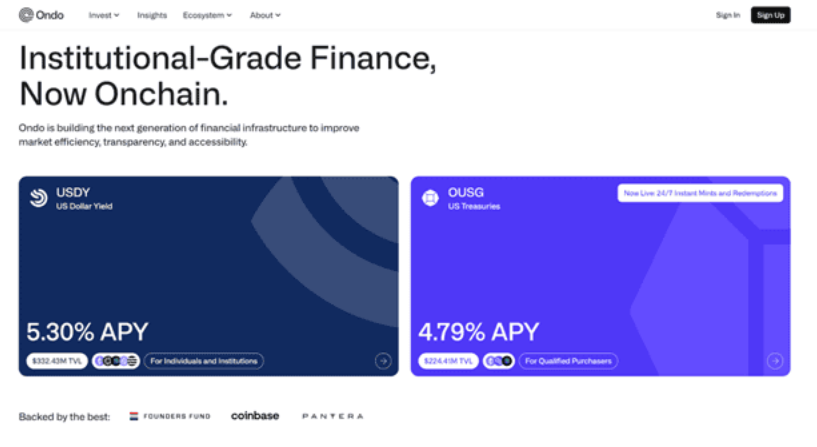
Ondo Finance is dedicated to integrating real-world assets (RWAs), such as bonds and treasury bills, onto the blockchain, primarily on the Solana network. The initiative aims to improve liquidity and efficiency by tokenizing these assets, allowing investors to trade seamlessly on the secondary market, avoiding the usual delays and administrative hurdles.
In addition, Ondo launched USDY on the Cosmos platform in June, a tokenized note backed by short-term U.S. Treasury bills with an annual yield of 5.2%. This integration enables Ondo's token products to be accessed on more than 90 blockchains interconnected through Cosmos's inter-chain communication protocol (IBC).
The protocol experienced significant growth in early 2024, primarily attributed to rising interest in tokenized assets, particularly tokenized treasuries, with Ondo dominating the market share.
Ondo has also expanded to other continents, opening offices in the Asia-Pacific region to meet the demand for tokenized assets.
Founder
Ondo Finance was founded in 2021 by Nathan Allman, who previously worked at Goldman Sachs’ digital asset team. The team includes former executives from Goldman Sachs, McKinsey & Company, Blackstone Group, and Bridgewater Associates.
Investors and Supporters
Ondo Finance has raised about $34 million in three rounds of funding. Wintermute Ventures and Pantera Capital are some of the major investors.
It is worth mentioning that Ondo Finance invested $95 million in BlackRock’s tokenized fund BUIDL, enabling Ondo Finance’s OUSGTokens to achieve instant settlement, which are backed by short-term government treasury bills.
The protocol also partners with regulated and qualified custodians, including Ankura and StoneX.
7) PancakeSwap: The top decentralized trading platform on the BNB chain
Brief Overview:
- The largest dApp on BN Smart Chain (BSC)
- Offers one of the lowest fees on the market
- Compatible with Ethereum
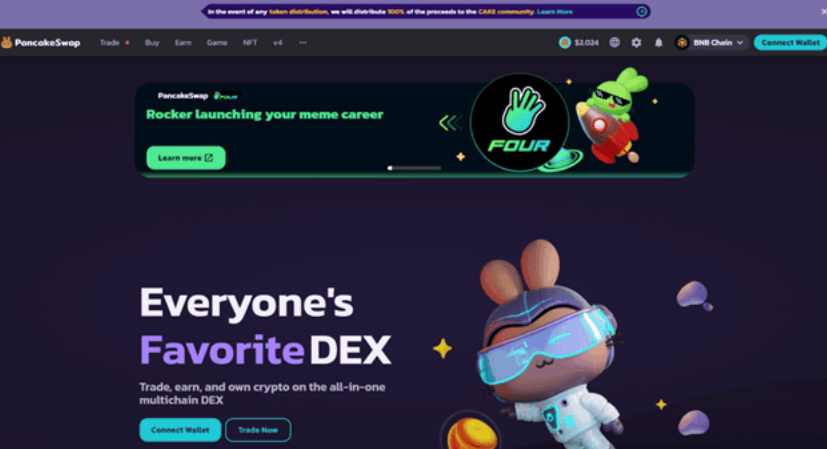
PancakeSwap (CAKE) is a decentralized exchange (DEX) built on BN Smart Chain. The protocol is known for its low fees and user-friendly dashboard, making it a highlight on BN Smart Chain.
Like other DEXs, PancakeSwap allows users to trade cryptocurrencies directly without a central authority or order book, thanks to its use of automated market makers (AMMs). In short, AMMs are algorithms that aggregate liquidity from multiple sources without relying on market makers or traders to provide liquidity.
PancakeSwap is popular for its large liquidity pool, where traders can earn returns through staking. In addition, it is compatible with MetaMask and supports cross-chain transfers from BSC to Ethereum and vice versa.
PancakeSwap V4 brings many benefits, including support for native gas tokens, reduced slippage and Impermanent Loss, native ETH support, etc.
Founder
PancakeSwap was launched by an anonymous team of developers in September 2020. Although the developers use pseudonyms and are generally active on social media, the platform has gained widespread trust and adoption within the DeFi community.
Investors and Supporters
PancakeSwap has received over $4 million in funding from at least three investors, including ICONIUM (during PancakeSwap’s ICO) and Platinum (seed round).
PancakeSwap is also backed by BN Labs. The trading platform’s venture capital and incubation arm invested an undisclosed amount in PancakeSwap’s utility and governance TokenCAKE.
8) Jito: Top dApp on Solana Blockchain
Brief Overview:
- The largest dApp on the Solana blockchain
- Strengthened market position through unique MEV (Maximum Extractable Value) and front-running approach
- Conducted one of the largest airdrops in crypto history
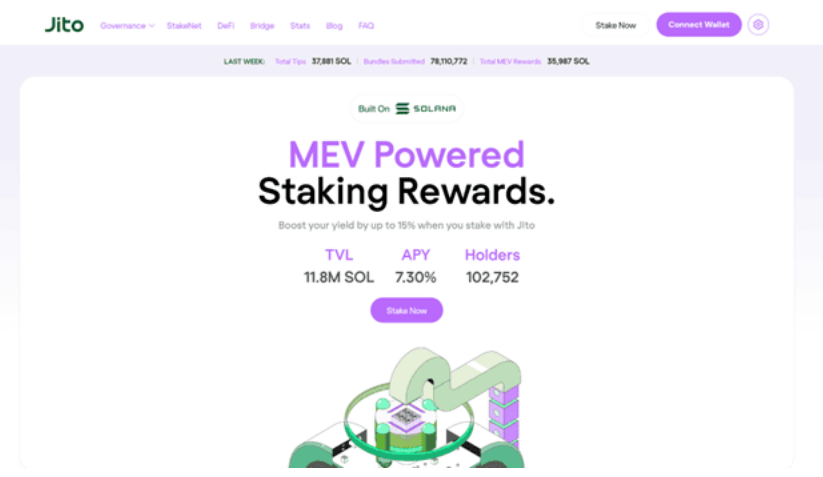
Jito (JTO) is one of the best DeFi projects on the Solana blockchain, widely recognized for its ease of use and intuitive dashboard.
It is a liquidity staking platform, similar to Ethereum’s Lido. However, Jito’s success stems largely from its innovative approach to handling MEV (maximum extractable value), a strategy that is leading the way in DeFi trading.
Jito solves the MEV problem by implementing an auction system where traders bid on a favorable transaction sequence optimized by a third-party block engine. This approach increases staker rewards and mitigates the benefits of spam transactions.
MEV will continue to be a topic of debate in the crypto space. On one hand, some argue that MEV miners exploit the system by front-running or reordering transactions on decentralized exchanges (DEXs), thereby gaining an unfair advantage and leading to a negative user experience.
On the other hand, supporters believe that MEV can improve market efficiency by identifying the best token prices on various trading platforms and solving economic inefficiencies in DeFi protocols. For example, MEV can ensure that lenders can get repaid when borrowers fail to meet collateral requirements.
Founder
Jito was founded by Jito Labs and led by Lucas Bruder (CEO) and Zano Shermani (CTO).
Bruder has a background in robotics and firmware, having worked at Ouster and Tesla. Meanwhile, Shermani worked as a software engineer at Parsec and is an alumnus of George Mason University. COO Brian Smith is also a key contributor to Jito Network.
Investors and Supporters
In 2022, Jito Labs raised $12 million in a Series A round led by Mult1C0in Capital and Framework Ventures. Since then, Jito’s influence in the Solana ecosystem has continued to rise, experiencing significant growth in total locked value in the first quarter of 2024.
In addition, Jito conducted a large-scale token airdrop on December 7, 2023, further consolidating its position in the market.
9) Founder of the largest decentralized stablecoin (DAI)
Brief Overview:
- An established protocol in the Ethereum ecosystem, founded in 2014
- Created DAI, one of the largest stablecoins by market capitalization
- Maker RWA was established to invest in off-chain assets
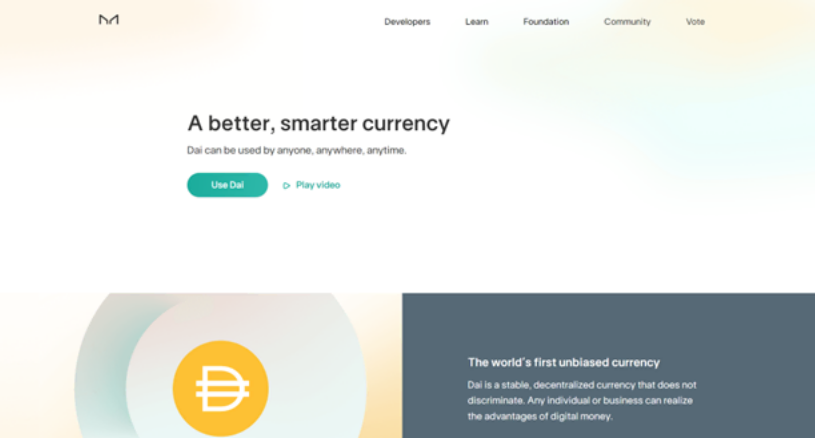
MakerDAO is a decentralized autonomous organization (DAO) built on the Ethereum blockchain. It is best known for creating the Dai stablecoin and promoting the rise of real-world assets (RWAs) on the Ethereum network.
Founded in 2014, MakerDAO operates through smart contracts, allowing users to borrow and lend cryptocurrencies, specifically Dai (DAI), using other assets as collateral. DAI is supported by almost all dApps in the industry and can be used for staking, lending, and as a utility and governance token.
MKR token holders are responsible for governance and participate in decisions regarding protocol parameters and risk management.
Founder
Rune Christensen is the co-founder and CEO of MakerDAO. Prior to that, he co-founded a recruitment company in China and studied biochemistry at the University of Copenhagen.
Christensen became interested in stablecoins after discovering Bitcoin in 2011 and experiencing the Mt. Gox hack, experiences that influenced his vision for creating more stable financial solutions through MakerDAO.
Another co-founder is Nikolai Mushegian, who is well-known in the crypto community for his work in the field of decentralized finance. He has a background in computer science and software engineering and made significant contributions to the development of the project until his death in 2022.
Investors and Supporters
MakerDAO has received significant investments from leading venture capital firms, including a16z and Polychain Capital. According to Crunchbase data, the protocol has raised nearly $80 million in funding, with the latest round of funding completed on December 1, 2021.
10) Raydium: Leading Decentralized Exchange on Solana
Brief Overview:
- The largest decentralized exchange by total locked value on Solana
- Integrates numerous functions to make transactions on the platform smoother and faster
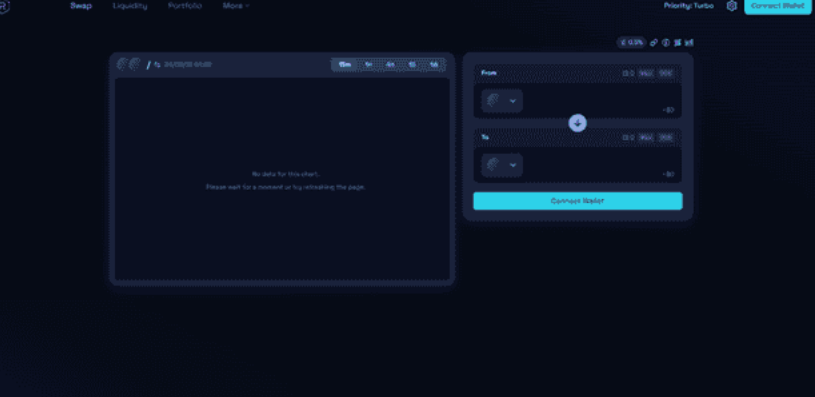
Raydium (RAY) is a major player in the decentralized exchange (DEX) space, often competing fiercely with Jupiter in terms of daily trading volume. It is known for its smooth, user-friendly interface, low transaction fees, and support for multiple cryptocurrencies.
The protocol has an easy-to-use dashboard that allows anyone to create a liquidity pool of token pairs, facilitating permissionless participation and enhancing liquidity within the ecosystem.
A highlight of Raydium is its integration with the OpenBook central limit order book, enabling Raydium users and liquidity pools to access broader liquidity and order flow across the OpenBook ecosystem, and vice versa.
Founder
Raydium's founders use pseudonyms, with the main character being AlphaRay. He is responsible for the overall strategy, operations, product direction, and business development of the protocol. He has a background in algorithmic trading in commodity markets and turned to market making and liquidity provision in the cryptocurrency space in 2017.
Investors and Supporters
Although there is no public information about Raydium’s investors or backers, the protocol has made significant investments in the DeFi ecosystem. Its latest investment took place on June 9, 2022, when Orderly Network raised $20 million.
11) 1inch: A veteran Ethereum decentralized trading platform
Brief Overview:
- One of the best decentralized trading platform aggregators on the market, providing users with the best prices for trading orders
- Nearly $190 million in financing has been obtained
- Backed by prominent investors including Platinum Capital
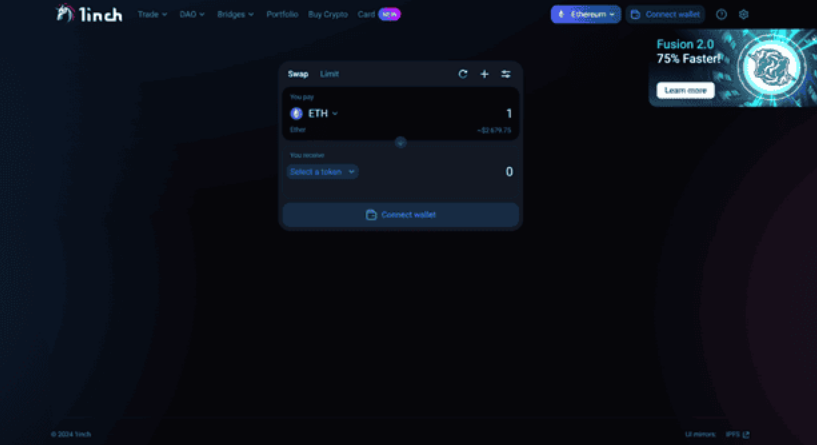
1inch is a well-known DeFi protocol that acts as a decentralized exchange (DEX) aggregator to help users find the best price and lowest fee on different decentralized exchanges. It optimizes transactions by integrating multiple liquidity sources to achieve efficient transaction execution.
The core of 1inch is its Aggregation Protocol, which aggregates liquidity from multiple sources to enable cost-effective and secure trading by using the Pathfinder algorithm. The Pathfinder algorithm optimizes the trading paths between different markets and takes into account gas fees for maximum efficiency.
Another important component of 1inch is the 1inch Liquidity Protocol, an advanced automated market maker (AMM) that improves the capital efficiency of liquidity providers while protecting users from front-running attacks. Users can earn annualized percentage yields (APY) by staking assets and participate in liquidity mining projects to obtain additional 1INCH tokens.
Founder
1inch was co-founded in May 2019 by Russian developers Serjez Kunz and Anton Bukov, both of whom have extensive experience in smart contract security and blockchain development. Kunz has about 13 years of experience in engineering and cybersecurity, while Bukov has been engaged in software development since 2002.
Investors and Supporters
1inch has raised over $189 million in six funding rounds, with the latest round completed on June 1, 2022. Some of the protocol’s major investors include Platinum Capital and Wave Digital Assets.
Aerodrome: The top lending protocol on Base
Brief Overview:
- Leading Liquidity Market on Base
- Backed by Coinbase Ventures
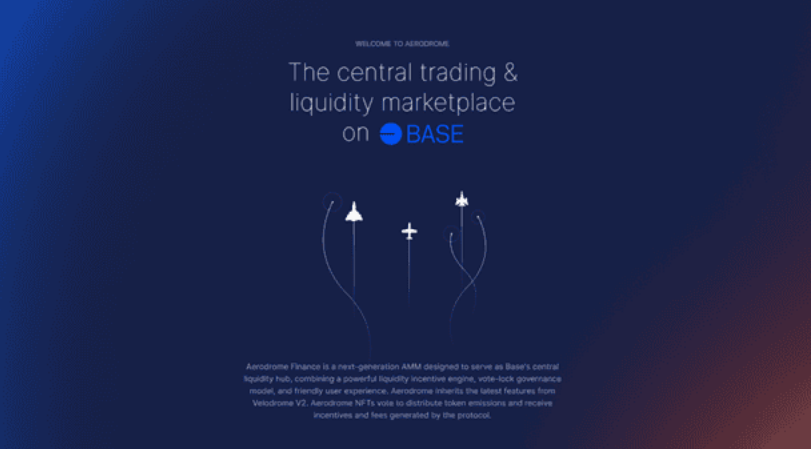
Aerodrome Finance is a decentralized financial protocol that runs on the Base network, which operates as an automated market maker (AMM) and liquidity center. Base is the Ethereum second layer network built by Coinbase.
Aerodrome was officially launched on August 28, 2023, aiming to facilitate efficient token exchanges and attract liquidity in the Base ecosystem. It combines the advanced features of Velodrome V2, another decentralized exchange (DEX) based on Optimism.
As a trader, you can exchange tokens with minimal slippage and pay low fees to AERO lockers. Liquidity providers deposit trading tokens and receive rewards issued by AERO.
It is worth noting that Aerodrome uses a multi-token system, where AERO is an ERC-20 token used to pay fees, place orders, and interact with liquidity pools. At the same time, veAERO is an ERC-721 token obtained by locking AERO. This allows you to vote on issuance allocations and receive transaction fees and other incentives.
Founder Aerodrome Finance was founded by Alex Cutler. His background covers politics, technology, and consulting. Cutler is also a core team member of Velodrome Finance, the leading decentralized trading platform on the Optimism network.
Investors and Supporters Aerodrome’s funding amount or latest valuation has not been made public. What is known is that Coinbase Ventures has made an undisclosed strategic investment in Aerodrome’s native token AERO.
12) Just Lend: The largest lending protocol on the TRON network
Brief Overview:
- The most popular lending protocol on the TRON network
- Founded and supported by Justin Sun
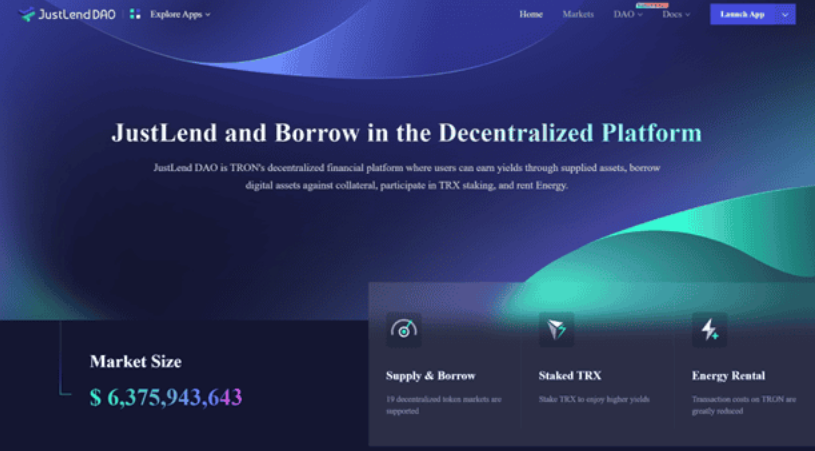
JustLend is a DeFi protocol running on the TRON blockchain that aims to enable the lending of digital assets without traditional financial intermediaries. It was created by Justin Sun with the goal of establishing lending pools based on the supply and demand of TRX and TRC20Token.
Users can lend cryptocurrencies to earn interest or borrow assets by providing collateral. The interest rate is determined algorithmically based on the supply and demand of TRON's underlying assets. However, borrowers must provide collateral that exceeds the loan amount to reduce the risk of default. In other words, all loans must be overcollateralized.
JustLend is part of the broader JUST ecosystem, which also includes JustSwap, JustLink, and JustStable.
Founder
JustLend was founded and supported by Justin Sun, the founder of the TRON network.
Investors and Supporters
There is little information available about JustLend’s investors, except for a small investment of £100,000 from millionaire Steven Barlett.
Here are some honorable mentions for other notable blockchain protocols:
13) Indigo Protocol
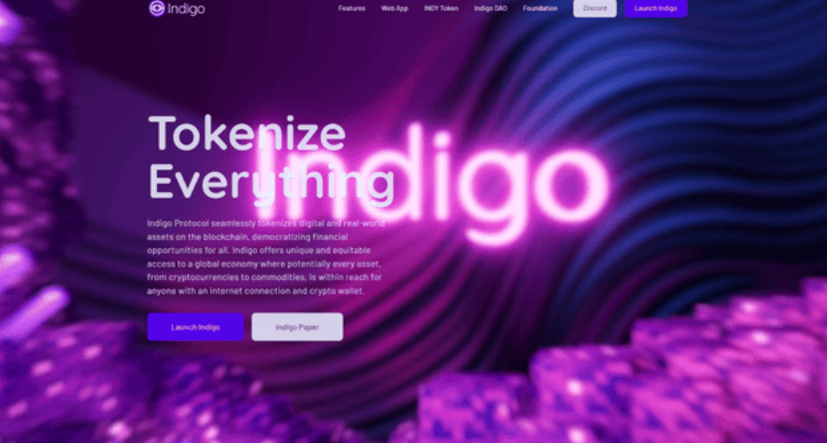
Indigo Protocol is a DeFi platform based on the Cardano blockchain that allows users to create and trade synthetic assets (iAssets). These synthetic assets provide exposure to real-world assets without directly owning them, thereby enhancing the flexibility and accessibility of the DeFi space.
Indigo allows users to mint synthetic assets through smart contracts. These iAssets can be traded on various automated market makers (AMMs) and used for yield farming.
The protocol features an autonomous oracle that updates the prices of real-world assets, ensuring that synthetic assets remain consistent with their real-world counterparts.
Founder
The founders of Indigo Protocol are Eric Coley and Dewayne Cameron. They launched the platform in November 2022 and reached a total locked value of $125 million in March 2024. Coley is a blockchain and cryptocurrency entrepreneur with more than 15 years of experience in the technology industry.
Cameron is the Chief Information Officer (CIO) at Indigo and holds an MSc in Finance from Durham University Business School.
Investors and Supporters
There is no public information about Indigo’s backers. However, Cardano founder Charles Hoskinson has endorsed it as one of the fastest growing protocols on the Cardano network.
14) Benqi
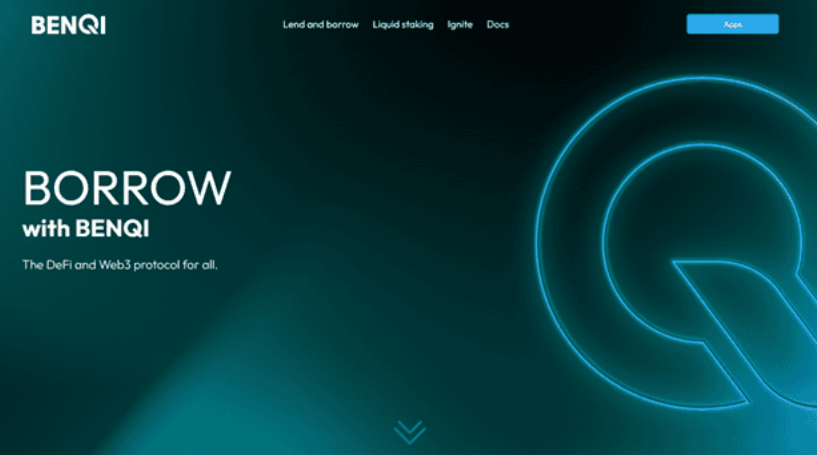
BENQI is a decentralized finance (DeFi) and Web3 protocol that provides a variety of financial services, including lending and liquidity staking.
The protocol provides a user-friendly and permissionless financial services platform covering functions such as lending, borrowing, and liquidity staking.
Specifically, BENQI consists of three main components:
- BENQI Markets : Users can borrow digital assets and earn interest here. This component provides a shared liquidity market where users can provide and withdraw liquidity, use their provided assets as collateral, and view real-time interest rates based on market dynamics.
- BENQI Liquid Staking : This service tokenizes staked AVAX, enabling users to use, exchange or pledge this yield asset in other DeFi applications. It adds utility to the staked assets and makes the locked capital transferable.
- Ignite : Ignite aims to launch Avalanche validators and subnets, enabling institutions, individual developers, and Web3 natives to launch validators and blockchains with less capital.
Founder Dan Mgbor is the founder of BENQI. He has a rich background in distributed ledger technology and decentralized applications, and has managed projects and provided technical consulting for organizations such as Plan International UK, DXC Technology, and Children's Hospital of Wisconsin.
He holds an MA from the University of Southampton and a BA from the University of Nottingham.
Investors and Backers BENQI raised $6 million in a fundraising round in April 2021. Some of its investors include Arrington XRP Capital, Morningstar Ventures, Rarestone Capital, and The Spartan Group.
2. How secure is DeFi?
DeFi is a highly unregulated industry. Here are some of the main risks you should be aware of:
- Smart contract vulnerabilities : Smart contracts are at the heart of DeFi, but they can be a security risk if not coded correctly. Hackers can exploit these vulnerabilities to steal funds. To mitigate the risk, many DeFi projects hire professional auditors to thoroughly review and test their code before releasing it publicly.
- Flash Loan Attacks : Flash loan must be repaid in the same transaction. While they can be used for legitimate purposes, they can also be used as scams; for example, malicious actors can manipulate token prices, drain funds from liquidity pools, and influence those who provide liquidity.
- Reentrancy attack : This attack occurs when an attacker repeatedly calls a function before the initial execution of the contract is completed, thereby draining funds in the process. This is a common vulnerability that requires special attention to prevent.
- Rug Pull : This scam occurs when the developer of a new token suddenly withdraws all funds from the liquidity pool, causing the tokens in the hands of investors to become worthless. This is particularly common in DeFi due to the relative ease of creating and promoting new tokens.
- Regulatory uncertainty : The legal landscape for DeFi is still evolving. Regulatory actions, such as the SEC’s case against LBRY, could have significant impacts on DeFi projects and their users.
- User Error : Many DeFi losses occur when users do not fully understand how the system works. Education and caution are critical for anyone looking to participate in DeFi.
3. Is DeFi suitable for beginners?
As a counterpart to traditional finance (known as TradFi in the crypto industry), DeFi builds on and innovates traditional financial mechanisms and services. But DeFi is not entirely friendly to beginners.
In fact, DeFi may be as complex as TradFi, or even more complex, as it involves the complexity of smart contracts, setting up and connecting cryptocurrency wallets, understanding blockchain technology, and more.
Although DeFi is a multi-billion dollar industry, it is still a nascent and unregulated space with many areas that still need improvement. There are risks of smart contract vulnerabilities, program errors, and the proliferation of hackers and phishing scams.
4. What problems does DeFi solve?
Despite these risks, DeFi still offers significant potential benefits:
- Accessibility : DeFi platforms are open to anyone with an internet connection, making financial services accessible worldwide without geographical restrictions.
- Eliminating intermediaries : By facilitating direct peer-to-peer transactions, DeFi eliminates the need for intermediaries such as banks, potentially reducing costs and increasing efficiency.
- Transparency : DeFi transactions are recorded on public blockchains, providing greater transparency and accountability compared to the secrecy of traditional financial systems.
- Financial freedom : Users have greater control over their assets, allowing them to negotiate loan terms directly without relying on a centralized institution.
- Financial product innovation : DeFi makes it possible to create new financial tools and services, such as flash loan and yield farming, which are impossible in traditional finance.
- Efficiency : DeFi transactions can be faster and more cost-effective than traditional financial services, especially when it comes to cross-border transactions.
- Interoperability : Many DeFi protocols are designed to work together, creating a more integrated and flexible financial ecosystem.
5. Does Bitcoin have DeFi?
Bitcoin itself does not have a built-in DeFi ecosystem, but through wrapped tokens like Wrapped Bitcoin (wBTC), it becomes possible to integrate DeFi into Bitcoin.
In addition, in recent years, Bitcoin’s Layer 2 (L2) technology has been designed and launched on top of the original Bitcoin blockchain to improve its scalability and throughput. These developments have led to the rise of various Bitcoin-native DeFi protocols, including lending, staking, and NFT trading platforms.
The rise of Bitcoin DeFi is largely due to protocols like Ordinals, which enable NFT creation on the Bitcoin network by attaching data to a single satoshi. Similarly, the BRC-20 standard is an experimental fungible token designed for the BTC blockchain, built on the Ordinals protocol.
6. Summary
This article introduces some of the best DeFi projects in 2024. These projects cover different sub-fields of DeFi, including real world assets (RWAs), lending, decentralized exchanges (DEXs), etc.
Additionally, we are not limited to Ethereum as many decentralized applications (dApps) come from multiple blockchain networks including Cardano, Avalanche, Solana, Base, and others.






